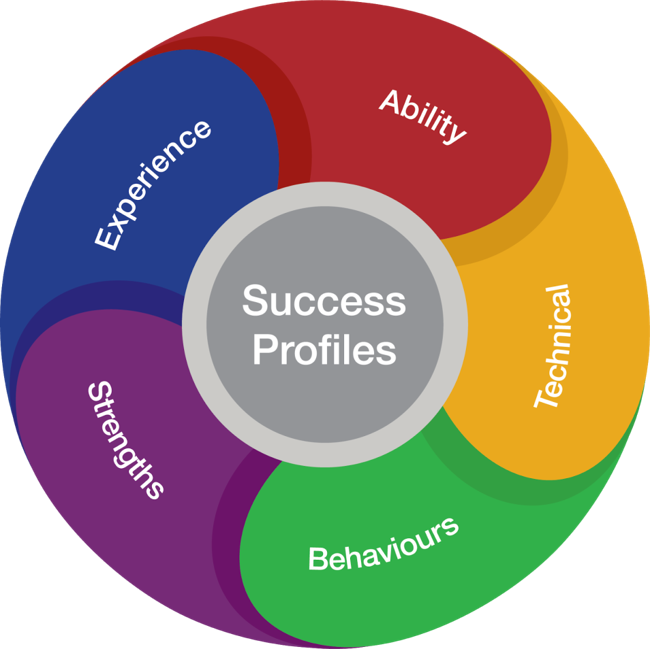Ready to take the next step? How our hiring process works
We know that applying for a job can be overwhelming. Our goal is to take some of those stresses away by providing useful information and advice to take with you throughout the application process.
We’re making recruitment at DfT fair and inclusive to everyone! We recruit using Success Profiles, which ensures a fair and inclusive hiring process, focusing on skills and experience.
Keep following to unlock your potential! Our guide breaks down each stage, with helpful tips to make your application shine.

This is a general guide to applying to DfT. Please note that each job advert has its own specific requirements. Make sure you always read the job advert in full and become familiar with what is required for that job. Use the information on this page and the Recruitment in Detail page just to support your application.
Our Hiring Process

Search
We’d love to have you as part of our team! With a diverse range of jobs for people from all backgrounds, you can find your dream job with DfT.

Apply
You’ve found a job that’s perfect for you. Now you need to submit your application. Use our helpful tips to show us how you’re right for the job.

Interview
It’s time to learn a bit more about each other. We’d love to know more about you and how you fit in the role, but it’s your chance to get to know us, too!

Outcome
We will carefully review all candidates who were invited to interview with us. If we think you’re a perfect fit for the job, you’ll be made an offer.
Searching for a role
We have lots of exciting opportunities to suit people at any stage of their career: From recent graduates, to those looking for a career change; anyone wanting to progress their career by gaining new experience, or maybe a promotion. Perhaps you simply want a flexible role to suit your lifestyle. We’re certain we have a job for you.
To start your search, go to Civil Service Jobs to see our available roles. You can filter by location, profession, salary and much more. You’ll find specific information about the job in the advert and role profile, and learn more about what you need to do for your application and interview.
Whichever job you choose, here at DfT we have a wide range of learning and development opportunities to support your career at all levels. Whatever your skillset or background, we’d love to have you on our team.

Tip 1: Sign up for Job Alerts
Make sure you sign up for Civil Service Jobs alerts. You can be one of the first to hear about new opportunities coming up in DfT and its agencies, and give yourself time to perfect your application.
Tip 2: Tailor alerts to you
Set up your Civil Service Jobs alerts to only hear about the jobs you’re interested in. Filter by location, profession, salary and so much more and simply wait for your dream job to arrive.
-
Where can I find job vacancies for Department for Transport and its agencies?
We have many different roles available within the Department for Transport and its agencies, you just need to pick one that’s right for you.
All our available jobs are listed on Civil Service Jobs, this is the only place we accept applications.
Visit the Civil Service Jobs website to see what vacancies are available right now. You can select our DfT or any of it’s agencies in the ‘organisation’ section. You can also filter by location, job type, salary expectations and working pattern to see which jobs are taking applications at the moment.
Can’t see a role you like? Sign up for job alerts on the Civil Service website to receive notifications the day new jobs get released. We advertise jobs daily, so be sure to keep your eye out for that dream opportunity!
If you’re at the start of your career, or looking for a change of profession, why not take a look at our Early Careers programmes.
-
Do the Department for Transport and its agencies offer flexible working?
Yes. On the left-hand side of the advert on Civil Service Jobs is a section called “Working Pattern”. This shows whether there is a flexible working option on offer for the role you’re interested in.
Achieving work-life balance is important for the wellbeing of our staff and most DfT roles will allow an excellent degree of flexibility around working patterns and locations.
Most jobs are offered as either flexible working, full-time, part-time or job share. The level of flexibility available may be different between roles, and an arrangement should be agreed before starting in the role.
-
Is there additional application and interview support available for people with disabilities?
We offer adjustments throughout the recruitment process as well as part of our standard offering to all staff. We also have schemes aimed at supporting people when applying for roles with DfT.
Click here to find out more about the Disability Confident Scheme and Reasonable Adjustments.

Applying for a role
Now that you’ve explored our opportunities and found a role you’re passionate about, it’s time to start your application.
Each job we advertise is designed to find the person with the right skills and experience for the job. How we ask candidates to apply for the job will be different depending on the job being offered.
We might ask you to complete an online test, or we may ask you to send us a CV and personal statement to show us your experience.
You’ll find all the information you need to apply the role in the job advert. We’ve put together some hints and tips, and answered some of the most frequently asked questions from candidates, to help make the application process as easy as possible.
Tip 1: Tailor your CV and Personal Statement
The panel reviewing your application want to know why you’re the best person for the job. Tailor your application to the job advert and role profile, and show us why you’re the perfect fit.
Tip 2: Focus on Success Profiles
We use Success Profiles to help us find the right person for the job. Learn what Success Profiles are and how they work so you can adapt your application to match the Success Profiles criteria in your job’s advert.
Tip 3: Use Evidence
In your application show us what you’ve done in the past and how you did it. What can you bring to the job role? Use your work experience, but if it’s relevant you can also talk about your studies or interests outside of work.
-
How do I apply for a role?
All job applications must be made through the Civil Service Jobs website.
When you see a job advert that interests you, click ‘Apply Now’. You will be asked to log in to your Civil Service Jobs account (or to sign up for one if you don’t have one set up yet).
The ‘Applications’ page is where you can see the progress of all your applications.
You will be able to see when you are invited to take tests or book interviews, and view feedback from the roles you’ve applied for. You can respond to offers or withdraw applications here too.
-
How do I apply for a role as a job share?
If you want to apply for job sharing posts, but currently do not have a job-share partner, you have a number of options:
- Find a job-share partner using the Civil Service job-share finder tool (Home | Civil Service Job Share Finder) and then apply for roles as prospective job-sharers
- Apply for a role part-time and be matched during the recruitment process to another candidate also applying part-time
- If the hours for a role can be increased, and you wish to remain in the post and to start job-sharing, then the additional hours can be advertised as a job-share only role
- Successfully apply for a role and then the vacancy holder runs a separate recruitment specifically to fill the second role in the job-share.
You will need to follow a different process depending on whether you are applying as an existing job-share partnership or separately as a prospective job-share partnership.
Click here to see more frequently asked questions on Job Sharing.
-
What will I be asked when applying for a role?
Each role we advertise is designed with a specific selection process. This is to make sure we are only asking for the information needed to demonstrate your ability to do the job.
You could be asked to complete an online test as part of your application. Or we might ask you to fill out a CV, personal statement, or application form. Or any mixture of these.
Click here to find out more information about applying for a role at DfT.
-
What are the Behaviours listed in the job advert?
‘Behaviours’ are linked to the Civil Service’s Success Profiles framework.
They are a list of actions and activities that are related to the job role being offered, and allows the person hiring for the role to find candidates with the most closely related skills and experience, and would most likely be the best fit for the role.
Most job adverts will have Behaviours, but there may be other Success Profile elements like Strengths, Experience or Technical on the job advert as well – depending on the type of job you’re applying for.
We suggest that you learn about the Success Profiles elements before submitting your application or attending your job interview to make sure the examples you give fit what the sift and interview panel are looking for.
Click here to find out more about Success Profiles and Behaviours.
-
What are online tests? How long do they take?
Depending on the type of job you’re applying for, we may ask you to do an online test.
The Civil Service has 7 different types of online test, ranging from verbal and numerical tests, to more skills-based tests.
If you have been asked to do a test, you will receive an email invite with full instructions and guidance on how to complete the test.
To get ready for your test, you can visit the Civil Service online tests (GOV.UK) page to see informational videos and to do practise tests before the real thing.
-
What should I include in my CV and personal statement?
A CV is a list of your employment history. It should include where you’ve worked, when you worked there, and your key responsibilities and achievements.
You shouldn’t include any personal information that could be used to identify you. This allows us to recruit ‘Name-Blind’. Recruiting this way means we can make a decision based on your knowledge and skills, and not your background, gender or ethnicity.
A Personal Statement is your chance to show how you are the best fit for the role.
You will be allowed between 500 and 1250 words to give examples of work you’ve done in the past that makes you suitable for this role.
Click here to read more about CVs and Personal Statements.
-
What happens after I submit my application?
Updates on your application are always sent to your email address. You should receive an email confirmation when your application is submitted. If you do not receive this, contact [email protected] right away.
It’s important that you check regularly for updates. Check your junk mail if you think you haven’t heard anything in a while.
You can also log into your Civil Service Jobs account and click the “Applications” tab to see the status of any jobs you’ve applied for.
If you have been successful, you will receive an email with your interview dates, times and location, and any other useful information that will help you prepare for your interview.
Click here to find out more about interview preparation.
-
Can I amend my application once I have submitted it?
Your application cannot be amended once you’ve submitted it. If you apply for the same role more than once, only your first application will be considered.
If your contact details have changed after submitting your application, you can update those in the “Account details” page of the Civil Service Jobs website. Your details will automatically be updated on your application.
If you have any questions or comments about the application you have submitted, contact [email protected] as soon as possible.
-
If my application has been unsuccessful, can I get detailed feedback?
We receive a lot of applications for roles and for this reason we do not offer detailed feedback on your application at the sift stage.
Your application will be scored between 1-7, based on the information you have been provided against the essential criteria. You can refer to the score you received to see how strong your application was.
-
I am already a Civil Servant, is there anything I need to know before I apply?
Depending on your personal circumstances, there are a number of policies that could be relevant to you making a job application to any department. We recommend you consult your staff handbook, review relevant policies that will likely be held on your intranet or, if in doubt, speak to a local HR representative to discuss your particular query.
-
Do you run any schemes for applicants from particular groups, such as a guaranteed interview scheme?
Yes. There are a number of schemes like this that DfT is a part of and these include the Disability Confident Scheme, and the Redeployment Interview Scheme (for existing Civil Servants). You may also be interested in learning more about the Great Place to Work for Veterans and Going Forward into Employment schemes.
Preparing for your interview
If you haven’t applied for a role with us before, our style of interviewing may be a new experience. We use Success Profiles to choose interview questions that are most relevant to the job. This gives all candidates the chance to show us their relevant knowledge and experience. We recommend you read about Success Profiles before attending your interview, and read the job advert carefully to see which elements you’ll be asked about.
At the interview we may ask you to complete an assessment. We have a range of assessments to choose from and are carefully designed to match exactly what you’ll be doing in the job you’re applying for. It gives us the opportunity to see your skills in action.
We understand that interviews can be a stressful experience. Remember it’s an opportunity for us to get to know each other. We want to know what skills and experience you can bring to the job, but it’s also a chance for you to learn more about us.

Tip 1: Take a breath before you answer
Remember, your interview panel is there to help you succeed, not to catch you out. Try your best to stay calm and take a moment if you need to think about your answer. Have a drink of water to help you relax and re-focus.
Tip 2: Listen to the question, answer the question
The interview is a chance for us to get to know you better, not a memory test. Listen to the question the panel is asking and think about how you’re going to answer. You can ask the panel to repeat the question at any time.
Tip 3: Evidence, evidence, evidence
Remember, the panel don’t know much about you! Make sure you’re familiar with Success Profiles and the essential criteria of the job, and go into detail about the evidence that proves you’re right for the job.
-
I have been invited to an interview. What can I do to prepare?
If you’ve never experienced an interview in the Civil Service before, the best thing you can do to prepare is to learn about Success Profiles.
Interviews in the Civil Service are built using Success Profiles, and help the panel interviewing you to learn more about your experience, your knowledge and what you could bring to the role. Each job role we advertise has a different set of elements to suit the job being advertised and the grade.
To give yourself the best chance at success, look through the Behaviours, Strengths, Experience or Technical elements you’re going to be assessed against. These elements will be listed in the job advert.
Remember that the interview is also your opportunity to get to know us! It’s your chance to ask any questions you may have. Whether that’s to clarify working patterns or ask what projects you’ll be working on, fire away!
Click here for more information on Interviews and Assessments.
-
What can I expect my interview to be like?
The job advert will feature how your interview will look, and if you will be asked to do an assessment or presentation alongside your interview. You will also get an email invite to your interview where you’ll find out more about what you’ll need to do for your interview and how to prepare.
Click here to see the different assessments you could be asked to do and what they mean.
You will likely meet an interview panel of two or three people. The panel is a diverse group of people currently working in the organisation you’re applying for, and will be familiar with the job role and the skills needed from the successful candidate.
The panel members will take notes of the things you say during the interview, but please don’t be put off by this. They are trying to capture everything you say to make sure they have a good amount of evidence to decide the best person for the role.
-
How do an interview panel decide who is the best fit for the role?
Interviews are based on a scoring system. Each part of your interview is scored on a scale of 1 (not demonstrated) to 7 (outstanding demonstration).
To make sure the role is given to the best candidate on merit, the person who scores the highest combined total from all parts of the interview session is offered the position.
Click here to find out more about Scoring.
-
How will I find out if I’ve been successful at the interview?
You’ll get an email notification when a decision has been made about who is going to be offered the job. Make sure to check your inbox regularly, and to check your junk mail if you haven’t received any updates.
You can also log into your Civil Service Jobs account and click the “Applications” tab to see the status of any jobs you’ve applied for.
Outcomes and offers
Thank you for taking the time to apply for a job and meet with us.
When your interview has finished, the panel will come together to discuss the information you have provided. Each of the candidates is given a score for each individual part of the interview. The candidate who has passed the interview stage with the highest score will be offered the job.
If you are successful… Congratulations! You’ll be given a provisional offer until your pre-employment checks have been passed. Once your pre-employment checks come back as clear, you’ll be given a formal offer and onboarded to your new team.

Tip 1: Be patient
We try to provide feedback on your interview as soon as we can, but it’s important that our panel take time to select the right candidate for the job. Check Civil Service Jobs and your email inbox regularly for any updates.
Tip 2: We’re here to support you
Don’t hesitate to ask questions if you’re in any doubt about your offer or any part of the onboarding process. Starting a new job is a big life event and we’re here to support you with any concerns you may have.
Tip 3: Don’t hand in your notice just yet!
In case there are issues with completing the hiring process, don’t hand your notice in until you’ve received your formal offer and contract.
-
I’ve been offered the job! What happens next?
Congratulations! You have just received your provisional offer for the role.
The job offer is only provisional until you have passed your pre-employment checks. Once they come back clear, you will receive your full formal offer.
To accept the provisional offer and start the pre-employment checks stage, log into Civil Service Jobs and click Accept.
Click here to find out more about Offers.
-
What are pre-employment checks?
Any role you apply for in the Department for Transport or its agencies will require a pre-employment check. Some job roles require more in-depth pre-employment checks, depending on the type of work you’ll be doing.
Click here to find out more about Pre-employment Checks.
-
I wasn’t offered the role, but I was placed on a ‘Reserve List’. What is a Reserve List?
A Reserve List is made up of candidates who passed each part of the interview stage but didn’t achieve the highest score to be offered the job.
You must score at least 4 out of 7 in each part of the job interview. If more than one person passes each part of the job interview, the person with the highest combined score will be offered the job first.
If a Reserve List has been kept, and should for any reason the highest scoring person not be able to accept the job, the next highest scoring person on the Reserve List could be offered the position.
Or, should a job become available that is very similar to the job you interviewed for, you could be offered that role instead
Click here to find out more detailed information about Reserve Lists.
Recruitment In Detail
Looking for some finer details?
We’ve broken down all the stages in our recruitment process to give you more in-depth step-by-step guidance.
Dive in to as much or as little as you need on our Recruitment In Detail page.
Success Profiles
We recruit using Success Profiles which means for each role we advertise, we consider what you will need to demonstrate in order to be successful.
This gives us the best possible chance of finding the right person for the job, drives up performance and improves diversity and inclusivity.

We highly recommend that you familiarise yourself with Success Profiles prior to applying. Understanding Success Profiles will allow you to tailor your application to the role and feel prepared for any assessments you are invited to.

